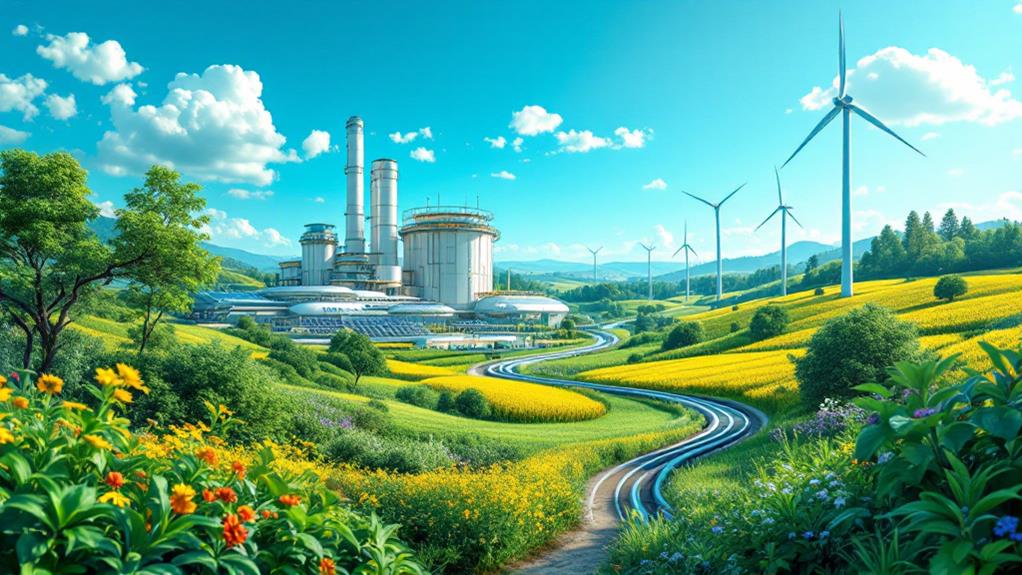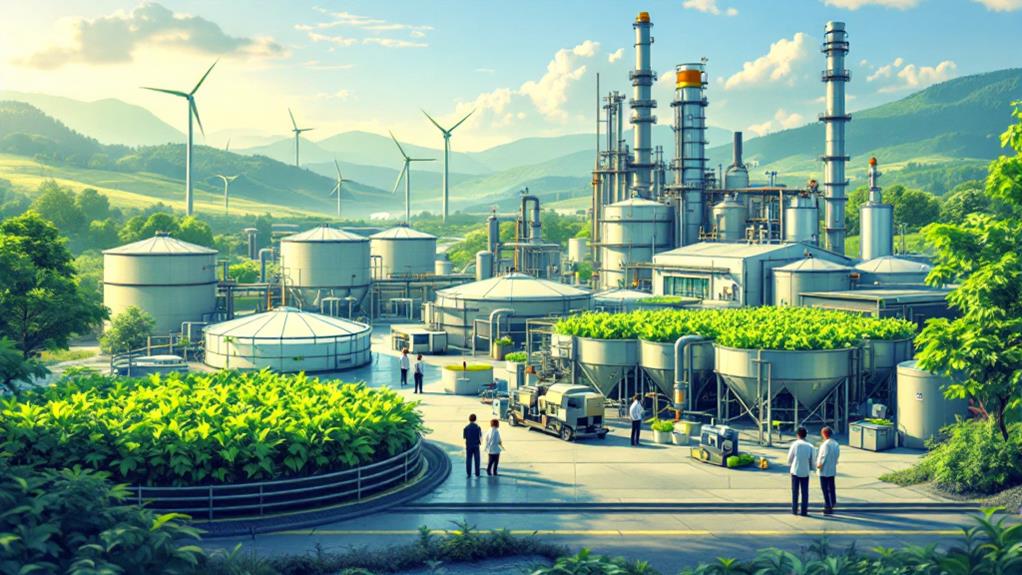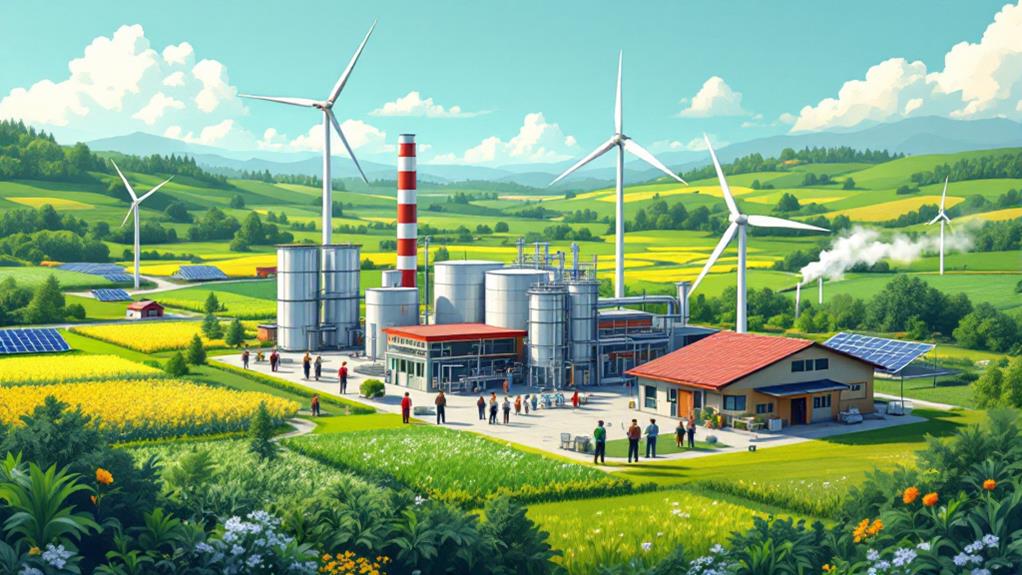What Is Biofueling and Why It’s Important for the Future of Energy

Biofueling is your gateway to a greener future, using organic materials like plants and waste to create energy. It's a renewable alternative that reduces dependency on fossil fuels, powering everything from vehicles to electricity grids. By embracing biofuels, you can help lower greenhouse gas emissions and combat climate change. Ethanol from corn, biodiesel from soybeans, and conversion of waste oils are just a few examples of biofuel types. Biofueling also enhances economic growth by creating jobs and reducing reliance on energy imports. Investigate the potential of bioenergy to transform our current energy landscape into a more sustainable one.
Understanding Biofueling
Let's investigate the basics of biofueling. Imagine a world where the energy you use daily is not only renewable but also contributes to a healthier planet. That's the promise of biofueling. By understanding biofueling, you're stepping into a domain where energy sustainability is at the forefront. Biofuels are derived from organic materials like plants and waste, making them a renewable resource that helps reduce our reliance on fossil fuels.
In your expedition to grasp biofueling, you'll notice its numerous applications. Biofuels power vehicles, generate electricity, and even provide heat for homes and industries. Unlike traditional fuels, biofuels have the potential to greatly lower greenhouse gas emissions, aiding in the fight against climate change.
You'll find that biofuel applications are diverse, ranging from biodiesel in cars to bioethanol in jet engines. Each application contributes distinctly to energy sustainability, making biofuels an essential part of our energy future. By adopting biofueling, you're supporting a shift towards an eco-friendly and sustainable energy landscape. This transformation isn't just critical for reducing carbon footprints, but it also guarantees a cleaner, more resilient energy system for future generations.
Types of Biofuels
Building on your understanding of biofueling, it's essential to investigate the different types of biofuels that drive this sustainable energy shift. Initially, consider ethanol, which is primarily derived from fermentation processes using ethanol sources like corn and sugarcane. These sources are renewable resources that offer a more sustainable alternative to fossil fuels. Ethanol is commonly blended with gasoline to reduce emissions and improve fuel efficiency.
Next, biodiesel is another significant player in the biofuel landscape. Biodiesel production often utilizes energy crops such as soybeans and canola, which are specifically grown for fuel purposes. Furthermore, waste conversion plays a substantial role in biodiesel creation, transforming used cooking oils and animal fats into a viable energy source through sustainable practices.
Algae cultivation is an emerging method that holds promise for future biofuel development. Algae can be grown on non-arable land and requires less water than traditional crops, making it an efficient and environmentally friendly option. It produces oils that can be processed into biodiesel or other forms of biofuel, showcasing the versatility of renewable resources.
Production Processes

When exploring the production processes of biofuels, understanding the diverse methods is fundamental to appreciating their sustainability. Initially, you need to contemplate feedstock selection, which involves choosing the raw materials used to produce biofuels. Common feedstocks include crops like corn, sugarcane, and soybeans, along with waste products like used cooking oil and agricultural residue. Selecting the right feedstock can greatly influence both the energy yield and carbon neutrality of the resulting biofuel.
Next, focus on fermentation methods, a key step in converting biomass into biofuels. For example, yeast or bacteria can convert sugars into ethanol through fermentation. This method is vital for achieving high energy yields while minimizing environmental impact. Conversion technologies also play an essential role in transforming feedstocks into usable fuels. Technologies like transesterification and gasification help convert oils and solid biomass into biodiesel and syngas, respectively.
Incorporating sustainability practices throughout these processes guarantees that biofuel production remains environmentally friendly. By using renewable resources and minimizing waste, you can improve the carbon neutrality of biofuels. Understanding each step in these production processes is critical for promoting a sustainable future in energy.
Environmental Benefits
Biofuels offer significant environmental benefits by reducing greenhouse gas emissions compared to fossil fuels. When you choose biofuels, you're tapping into a solution that lowers your carbon footprint. These fuels are derived from renewable resources like plants and waste materials, meaning they can be replenished naturally and sustainably. Here's why biofuels are an environmentally friendly choice:
- Carbon Neutrality: Biofuels are often considered carbon-neutral because the carbon dioxide they emit when burned is roughly equal to the amount absorbed by the plants during their growth cycle.
- Reduced Air Pollution: Unlike fossil fuels, biofuels produce fewer pollutants that contribute to smog and health issues, helping to improve air quality.
- Sustainable Lifecycle: Since biofuels are made from renewable resources, they offer a sustainable energy solution that doesn't deplete the earth's natural reserves.
Economic Impact

Beyond their environmental benefits, biofuels also play a significant role in the economy. By investing in biofuel production, you contribute to job creation across diverse sectors. From research and development to production and distribution, countless jobs are created, stimulating economic growth. This market growth doesn't just benefit those directly involved; it also extends to supporting industries, creating a ripple effect throughout the economy.
Biofuels also improve energy independence. By reducing reliance on imported fossil fuels, countries can stabilize their energy resources and protect themselves from volatile global oil markets. This shift makes nations more self-reliant and resilient, which is vital for economic stability.
Rural development is another significant benefit of biofuel production. Many biofuel plants are located in rural areas, providing much-needed jobs and revitalizing these communities. This leads to improved infrastructure and services, enhancing the quality of life for residents.
Moreover, biofuels attract significant innovation funding and investment opportunities. As technology advances, there's a continuous push for more efficient and sustainable biofuel solutions. This atmosphere of innovation not only drives economic progress but also encourages further investment, ensuring the industry's long-term viability and growth.
Future Prospects
Looking ahead, the future of biofuels shines brightly, given their potential to transform the global energy landscape. As sustainability trends drive the search for cleaner energy sources, biofuels offer a promising solution. You'll find that technological innovations are at the forefront, pushing biofuels to become more efficient and accessible. By investing in these advancements, you can contribute to a world less dependent on fossil fuels and more focused on renewable resources.
Consider these compelling reasons why biofuels could dominate the future energy market:
- Environmental Impact: Biofuels can markedly reduce greenhouse gas emissions compared to traditional fossil fuels. By choosing biofuels, you're supporting a cleaner, healthier planet.
- Energy Security: Producing biofuels locally reduces reliance on imported oil, enhancing energy independence. You'll be part of a movement that prioritizes national resources and stability.
- Economic Opportunities: The biofuel industry creates jobs, from research and development to production and distribution. Joining this sector means you're helping foster economic growth and innovation.



